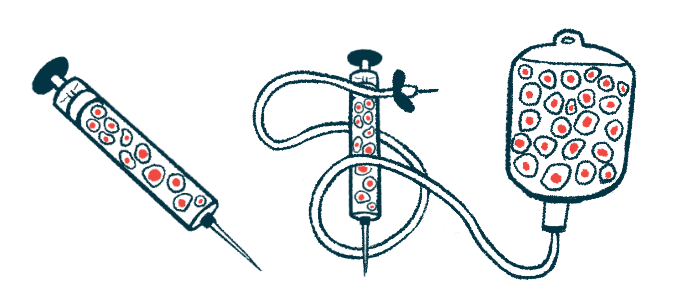Stem cell therapy safely eases CMT1A symptoms in small trial
Encell treatment shows 'promising' results in early clinical testing
Written by |

EN001, a stem cell therapy being developed by Encell, was found to safely ease symptoms of Charcot-Marie-Tooth disease type 1A (CMT1A) in early clinical testing.
That’s according to the results of a Phase 1 trial (NCT05333406) involving nine adults with a genetically confirmed diagnosis of CMT1A. The participants received a single intravenous, or into-the-vein, infusion of EN001 containing either a low dose of 0.5 million or a high dose of 2.5 million stem cells.
The clinical results, which Encell called “promising” in a company press release, were shared during an oral presentation at this year’s Peripheral Nerve Society (PNS) annual meeting, held last month in Montréal.
For Byung-Ok Choi, MD, a professor of neurology who is leading the clinical trial at the Samsung Medical Center, in Seoul, “these results provide hope to CMT1A patients, a group affected by a rare disease without existing treatments.”
CMT1A treatment candidate now will be tested in new Phase 1 trial
In a separate Phase 1 trial (NCT06328712) at the Samsung Medical Center, the company is now recruiting up to 12 adults with CMT1A to further test the therapy’s safety, including its tolerability, and efficacy. Participants ages 19 and older will receive two doses of EN001 — this time containing either 1.25 or 2.5 million stem cells — separated by four weeks.
The main goal is to watch for dose-limiting side effects for up to eight weeks to determine the maximum tolerated dose, or the highest dose of EN001 that does not cause unacceptable side effects.
CMT1A occurs when PMP22, a protein that forms part of the myelin sheath that protects nerve fibers, is in excess and therefore nonfunctional. This results in loss of myelin and, as a result, slow transmission of nerve signals between the brain and muscles, muscle weakness and wasting, and reduced sensation, specifically involving touch, heat, and cold.
Mesenchymal stem cells, which may turn into various different types of cells in the body, have been linked to a boost in myelin production.
EN001 uses mesenchymal stem cells from Wharton’s jelly, a gel-like substance found within the umbilical cord. These stem cells have shown the ability to migrate to and regenerate damaged nerves in preclinical studies, according to the company.
Now, the results from its first-in-human trial in adults with CMT1A show that EN001 appears to be safe and well tolerated, with no dose-limiting or serious side effects, or infusion-related reactions.
The therapy also appears to be effective. On average, the Charcot-Marie-Tooth Neuropathy Score version 2, in which a higher score indicates more severe disease, significantly dropped by 2.89 points after 16 weeks, or about four months. Patients who received the higher dose of EN001 benefitted the most, with a drop of 3.5 points, according to the company.
Further analysis associated the high dose with less severe disease, with some participants moving from severe to moderate, or from moderate to mild categories. Participants also did better in motor tests, such as the 10-Meter Walking Test and the Functional Disability Scale, and also in nerve conduction tests.






